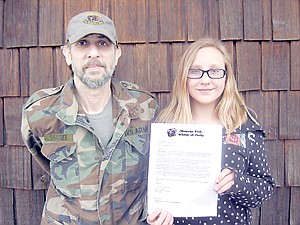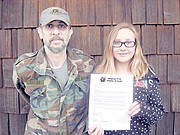Hunters prepare for bear season
Hunters experiencing withdrawal after a long winter will be able to get their fix as black bear hunting begins Monday.
To hear some speak of a spring bear hunt, there is a tone of both respect and revelry.
“Bears can be dangerous. I’ve been charged by a sow with a cub, and mostly, all they’re trying to do is scare you,” said Gerry Mercer, a taxidermist and local sportsman who took a bear last season. “I’ve learned you’ve got to respect bears. Hunting black bears and grizzly bears is quite a bit different. They’ve got different temperaments. While a black bear will try to scare you, brown bears and grizzlies will come right at you and put the hurt on you.”
Mercer has hunted grizzlies in Alaska.
In Montana, Mercer spoke with excitement and a sense of ease in a spring bear hunt.
“Grasses are coming up. The trees come to life and animals begin to move again,” Mercer said. “They get out there, and they’ll eat just about anything. They’re a garbage machine. I’ve seen them eating decaying carcasses with maggots, maggots and all. They’re disgusting.”
Then the veteran black bear hunter offered some tips.
“I look for bear (scat). They may visit an area and return there for awhile,” Mercer said offering a bear-hunting hint, surrounded by beautiful bear mounts and rugs, full-body mounts of mountain lions, mountain goats and a collection of deer and elk mounts. “Springtime — It’s a great time to be in the woods. Spring bear hunting is a major deal for me.”
Black bears make terrific trophies and not everyone will eat the meat, but Mercer recommends for those who do like to make sausages, as he does, to get the meat tested for trichinella, a parasite that can be harmful if infected meat is not cooked thoroughly.
“For any older bear, I’d have it tested,” Mercer said. “If you cook the meat well enough, it’s OK. I’d only make smokeys (sausages) out of bear meat.”
Montana Fish, Wildlife & Parks will test the meat free. Hunters should send one-third of the tongue or equally sized muscle tissue to FWP Wildlife Research Lab, Box 173220, Bozeman, Mont., 59717-3220. A mail-in kit may be requested from any FWP regional or area office.
All first-time black bear hunters must complete and pass an online black bear identification class, and proof of successful completion of that class is required before hunters may purchase their license. The test is required so hunters do not accidentally shoot a grizzly. In 2012, a hunter near the Montana-Idaho border accidentally shot a grizzly bear, followed it into the brush and, ultimately, had a close-contact encounter with the grizzly that led to the mauling and accidental shooting of his hunting partner.
The season begins Monday, April 15, and ends on May 31 in immediate areas within Bear Management Units 100, 102, 103 and 104, which includes most of Lincoln County. Hunting may begin one-half hour before sunrise and sessions must end one-half hour after sunset. Rifle hunters are required to wear blaze orange of at least 400 square inches.
Also, no electronic or recorded game calls may be used.
Montana residents pay $19 for a black bear tag while non-residents must pay $350.
While Mercer has vast black-bear experience, Cerria Swagger plans to get her first black bear tag in 2013.
“No, I’m not too concerned,” said Swagger who has hunted black bear previously with her father, Bill. However, this will be the first time she has her own tag.
“My dad will go with me, so I really don’t have any concerns,” she said. “I’ve learned in our science and social science classes that people are at the top of the food chain.”
Swagger’s father said he’s happy to see his daughter getting her own tag.
“A bear’s best senses are its sight and smell, and we’ll make sure we have bear spray,” Bill Swagger said. “That has a way of taking a bear from fight to flight.”
Fish, Wildlife & Parks Bear biologist Kim Annis said no bear hunter should take to the forests without a current and tested bear spray.
“People are hunting black bears in grizzly bear country, and the first defense should be bear spray,” Annis said.
Annis explained a quality bear spray will create a space between the bear and the hunter and has the potential to stop a bear in it’s tracks, while that may not always be the case if the first choice of protection is a weapon.
“Bear spray will create a wall. It’s not a perfect solution but it could be the best solution to give the user a chance to back up and get away,” she said.
Annis was clear. While a weapon can, with one well-placed shot, drop a bear, it difficult to execute that shot when in a hurry.
“It’s incredibly difficult to get that kind of shot. And if a bear’s wounded, it can change and become more dangerous,” she said.



